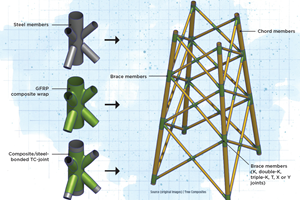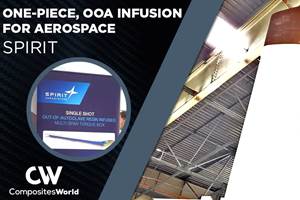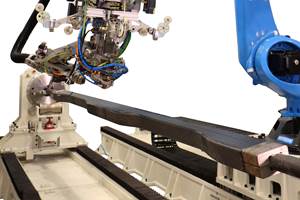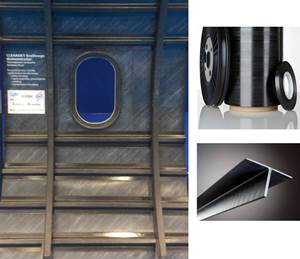High-performance composites in Israel
Four major manufacturers — diverse, yet with shared commitment — showcase global aerocomposites industry capacity and this region’s potential for future growth.
- Wind/Energy
- Cutting/Kitting
- Automotive
- Defense
- Carbon Fibers
- Out of Autoclave
- Composites 4.0
- Machining/Drilling
- Materials
- Glass Fibers
- Fabrics/Preforms
- Pressure Vessels
- ATL/AFP
- Processes
- Epoxies
- Resins
- Thermoplastics
- Aerospace
- Reinforcements
- Autoclave
- Additive Manufacturing
- RTM
- Curing
- Medical
- Infusion
As CW’s editors developed this Plant Tour Supplement for the July 2018 issue of CompositesWorld, it quickly became clear that half of its tours would profile composites manufacturers from the state of Israel. Why half? For one, Israel, in its short history, has become an economic powerhouse, and two, it has become a hotbed of cutting-edge technology. And composites are on the cutting edge.
Israelis are proud of their country and their expanding high-tech industry prowess. Roughly the size of New Jersey, Israel has become a world leader in digital technology, and Israeli firms have been the beneficiaries of one-fifth of the world’s private investment in cyber security. Dubbed “Startup Nation,” Israel has recorded more startups and venture capital transactions per capita than any other country. In fact, there are more than 300 international firms with high-tech research centers in Israel, including Microsoft, IBM, Apple, Cisco and HP.
When CW was invited to tour the composites end of Israel’s high-tech movement by Industry 4.0/industrial Internet of things (IIoT) specialist Plataine (Waltham, MA, US), which has its R&D center in Israel, CW had already explored that sector to a degree in several articles about Plataine and its customers over the past few years. So, CW’s editorial team agreed it was a tour worth taking. Ultimately, four facilities were visited: Israel Aerospace Industries (Lod) and subcontractor FBM (Kiryat Gat) in the south, and in the north, high-growth Kanfit (Migdal HaEmek) and Elbit Cyclone (Karmiel).
Spectrum of size and personality
Although two of the companies are quite large — IAI has 15,000 employees and Elbit has 12,500 — their composites operations employ hundreds. That puts those operations closer to parity with those of Kanfit and Elbit, which field 188 and 140 employees, respectively. However, the personalities of the companies are quite different. IAI, the largest and oldest, is a pillar in Israel’s defense industry and a global defense technology leader with a corresponding security culture that makes access to details difficult. Yet it has participated in more than 86 EU-funded, pan-European R&D projects (many composites-focused), has invested heavily in R&D, and has more than a decade of experience building primary structures using resin infusion and resin transfer molding (RTM).
FBM is almost an opposite — small, very open and, of the four, the most recently established, having been added to The Boeing Co.’s (Chicago, IL, US) Qualified Processor List (QPL) in 2012.
Kanfit, also small, is growing quickly, preparing for a second autoclave and its next expansion. In addition to its aerospace production expertise, it has established a competency for innovative medical device solutions that rely on composites, but also extreme accuracy, often enabled by RTM. Like IAI, it sees opportunity with RTM and moving parts out of the autoclave.
The subsidiary of a large global defense company, Elbit Cyclone can match IAI’s long history and worldwide presence in aerospace production, both in Israel and worldwide. Yet its lean workforce, flexibility and composites growth are reminiscent of a start-up. It, too, has developed RTM expertise through its integrated, fastener-free technology for all-composite aircraft doors and control surfaces. However, like Kanfit, it also is investing in technologies like 3D printing to support its design and production capabilities for advanced metal-composite assemblies.
Shared industry commitment
The four companies use both metals and composites, but in each case, composites are a growing technology. Although all possess liquid molding capability, their composites manufacturing operations are mostly build-to-print, using hand layup, autoclave-cured prepreg. As Elbit Cyclone’s senior manager for business development and marketing, Jonathan Hulaty, quipped, “that may not sound so glorious,” but it is the engine that powers the aerospace composites industry.
In fact, for CW, it was instructive to see, first hand, the materials and methods used to produce and ship worldwide thousands of composite parts, with high reliability and repeatability, to meet increasingly higher monthly production rates, aided by the latest in automated cutting, kitting, forming, preforming molding and curing equipment.
The composites industry in Israel, of course, includes other fabricators and suppliers that CW did not tour. But the impression is that although the number of overall players is small, their diversity, innovation and capability has positioned Israel well for growth.
Related Content
Novel composite technology replaces welded joints in tubular structures
The Tree Composites TC-joint replaces traditional welding in jacket foundations for offshore wind turbine generator applications, advancing the world’s quest for fast, sustainable energy deployment.
Read MoreVIDEO: One-Piece, OOA Infusion for Aerospace Composites
Tier-1 aerostructures manufacturer Spirit AeroSystems developed an out-of-autoclave (OOA), one-shot resin infusion process to reduce weight, labor and fasteners for a multi-spar aircraft torque box.
Read MoreMFFD thermoplastic floor beams — OOA consolidation for next-gen TPC aerostructures
GKN Fokker and Mikrosam develop AFP for the Multifunctional Fuselage Demonstrator’s floor beams and OOA consolidation of 6-meter spars for TPC rudders, elevators and tails.
Read MorePEEK vs. PEKK vs. PAEK and continuous compression molding
Suppliers of thermoplastics and carbon fiber chime in regarding PEEK vs. PEKK, and now PAEK, as well as in-situ consolidation — the supply chain for thermoplastic tape composites continues to evolve.
Read MoreRead Next
“Structured air” TPS safeguards composite structures
Powered by an 85% air/15% pure polyimide aerogel, Blueshift’s novel material system protects structures during transient thermal events from -200°C to beyond 2400°C for rockets, battery boxes and more.
Read MoreDeveloping bonded composite repair for ships, offshore units
Bureau Veritas and industry partners issue guidelines and pave the way for certification via StrengthBond Offshore project.
Read MorePlant tour: Daher Shap’in TechCenter and composites production plant, Saint-Aignan-de-Grandlieu, France
Co-located R&D and production advance OOA thermosets, thermoplastics, welding, recycling and digital technologies for faster processing and certification of lighter, more sustainable composites.
Read More






















